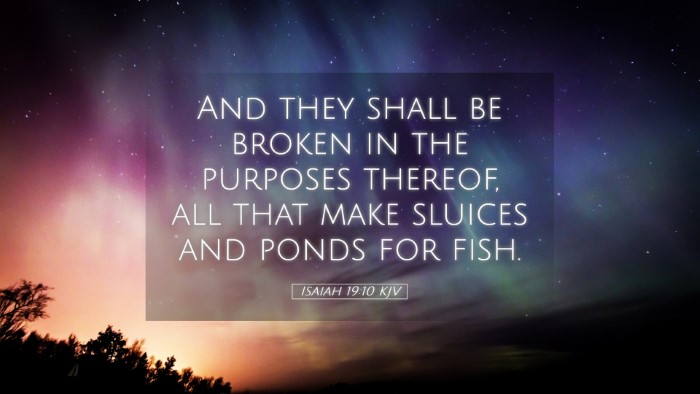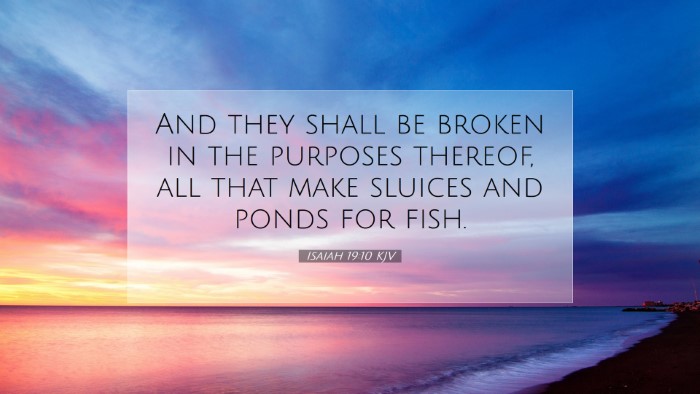Commentary on Isaiah 19:10
Verse Text: "And they shall be broken in the purposes thereof, all that make sluices and ponds for fish."
Contextual Background
The prophecy found in Isaiah 19 addresses Egypt's devastation and the consequences of its idolatry and reliance on faulty wisdom. These verses depict a time of judgment upon Egypt, illustrating divine disapproval of their practices and systems that oppose God's order.
Matthew Henry's Insights
Matthew Henry emphasizes the futility of relying on human schemes for prosperity and sustenance, especially in a time of divine judgment. He illustrates that the "sluices and ponds for fish" – symbols of man's industrious efforts to secure a livelihood – would ultimately prove ineffective. Henry identifies this as a reflection of a broader spiritual principle: without God's blessing, all human endeavors are destined for failure. Thus, the natural resources and sustenance that Egyptians relied upon are entirely at the mercy of God’s will.
Albert Barnes' Commentary
Albert Barnes provides a comprehensive analysis of the socio-political implications within this verse. He notes that the destruction of the "sluices and ponds for fish" illustrates the collapse of the agricultural and economic systems in Egypt. Egypt was heavily reliant on the Nile for irrigation and prosperity. Barnes argues that the imagery used by Isaiah signifies the breakdown of both natural and socio-economic order, leading to widespread impoverishment that would result from their forthcoming captivity and distress. He urges readers to understand that this disintegration is a direct consequence of abandoning true worship and adopting foreign idols.
Adam Clarke's Reflections
Adam Clarke takes a detailed approach to the metaphor of failing sluices and ponds. He interprets these structures as key to maintaining Egypt’s agricultural successes. With the removal or destruction of these, Clarke suggests, not only would the economy suffer, but the people's livelihoods would be severely threatened. He points out that such divine judgment was not merely punitive but also designed to lead the people back to a recognition of the one true God. Clarke challenges the reader to reflect on their own reliance upon secondary causes (like agriculture, in this case) instead of God Himself, reminding us that all provisions ultimately stem from divine grace.
Theological Significance
- The Sovereignty of God: The verse powerfully illustrates that God's sovereignty prevails over all human schemes. Both Henry and Barnes inform us that without divine endorsement, human efforts become futile.
- Judgment and Restoration: This passage acts as a reminder that judgment is a pathway to restoration. The plight of Egypt serves as an essential biblical principle that the downfall often precedes the opportunity for redemption.
- Human Limitations: The references to practical workings of irrigation systems underline the limitations of human endeavor. It reiterates the biblical assertion that man’s wisdom is inadequate without divine insight.
Application for Modern Readers
The poignant message in Isaiah 19:10 resonates compellingly in contemporary settings, where self-sufficiency often leads to a neglect of faith in God. It calls pastors, students, and theologians to reassess their parameters of success and sustainability. Here are some critical reflections for modern readers:
- Re-evaluating Dependence: This verse challenges congregations to reconsider where they place their trust, encouraging a shift from dependency on societal systems to full reliance on God’s provision.
- Recognizing God’s Grace: Just as Egypt faced consequences for their abandonment of divine principles, readers must be mindful of remaining tethered to God through faith and obedience.
- Encouraging Holistic Ministry: In the application of this teaching, church leaders can foster holistic ministry that prioritizes spiritual well-being along with practical needs, continuously pointing believers toward the ultimate source of life: God's grace.
Conclusion
Isaiah 19:10 stands as a sobering reminder of the delicate balance between human efforts and divine oversight. The failure of Egypt’s “sluices and ponds” starkly illustrates the futility of relying solely on human wisdom in facing life’s challenges. By integrating insights from renowned commentators such as Matthew Henry, Albert Barnes, and Adam Clarke, we uncover profound truths about God’s sovereignty, justice, and the essential need for reliance on His grace. As individuals and communities, turning back to God is paramount in seeking lasting solutions for both spiritual and material struggles.


